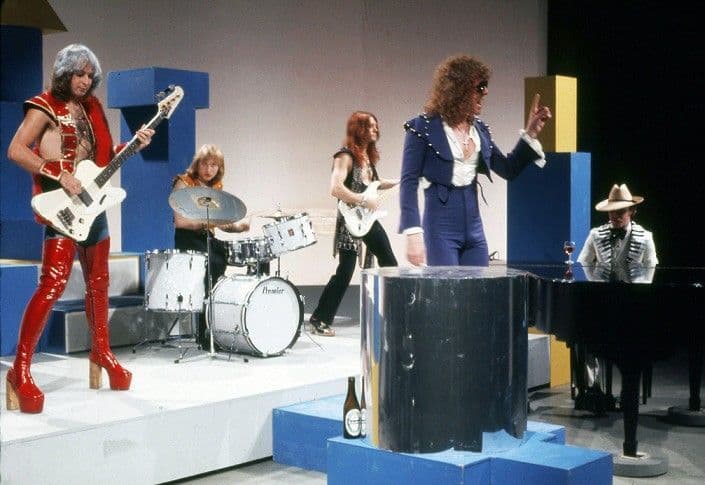
“All the Way from Memphis”: A Rock and Roll Odyssey of Triumphs and Tribulations
Ah, Mott the Hoople. Just uttering that name conjures up a specific kind of vibrant, slightly chaotic energy, doesn’t it? For those of us who came of age with the shimmering sounds of glam rock rattling our speakers, Mott the Hoople was more than just a band; they were an experience. They had a swagger, a knowing wink, and a knack for crafting songs that spoke to the heart of what it meant to be young and alive in the early 70s. And among their impressive catalog, one track stands out as a gritty, honest testament to the often-unglamorous reality of life on the road: “All the Way from Memphis.”
Released in August 1973 as the lead single from their seminal album, Mott, this track captured a moment in time with remarkable precision. While it might not have set the American charts ablaze, it nonetheless garnered significant airplay on album-oriented rock stations across the US, helping to solidify Mott the Hoople‘s reputation as a formidable force in rock. More significantly, it was a smash hit across the pond, climbing all the way to number 10 on the UK Singles Chart. The parent album, Mott, itself was a critical and commercial triumph, peaking at number 7 in the UK Albums Chart and a respectable number 35 on the US Billboard 200. These chart positions, while perhaps not the stratospheric heights reached by some of their peers, represented a significant achievement for a band that had, just a couple of years prior, been on the verge of calling it quits, only to be famously resurrected by the patronage of none other than David Bowie.
But beyond the numbers, “All the Way from Memphis” resonates deeply because of the story woven into its very fabric. It’s a tale ripped straight from the road diary of Ian Hunter, Mott the Hoople‘s charismatic frontman and the song’s sole writer. The narrative, delivered with Hunter’s signature blend of cynicism and weary resignation, recounts a particularly trying incident from the band’s 1972 US tour. Imagine this: the tour is nearing its end, culminating in a show in Memphis. Guitarist Mick Ralphs and keyboardist Verden Allen, opting for a more grounded journey, decide to travel by road, while the rest of the band and their crucial equipment take to the skies. What unfolds next is the stuff of rock and roll legend, or rather, rock and roll nightmare.
Ralphs’ beloved guitar, a cornerstone of their sound, somehow gets misrouted, ending up in Oriole, Kentucky, instead of its intended destination. The horror! A musician without their instrument is like a painter without their brush. The song vividly paints the picture of the frantic efforts to retrieve the missing gear, a desperate chase across state lines, only for it to finally arrive in a somewhat battered state, leading to Hunter’s memorable line about feeling “ashamed” when the clerk, in a moment of detached observation, remarks, “You rock and rollers, you’re all the same.” This seemingly simple encounter encapsulates the often-unseen struggles of touring musicians, far removed from the dazzling lights of the stage.
Yet, the story behind the song has an even richer, almost miraculous twist. As the band prepared for the Memphis gig, initial reports painted a grim picture: ticket sales were abysmal. It seemed like the triumphant end to their tour would be a desolate, sparsely attended affair. However, as the band arrived, a different reality began to emerge. The turnstiles, it turned out, had broken down, and a throng of thousands was clamoring to get in, creating the illusion of an empty house. What appeared to be a disaster transformed into an “incredible triumph wrenched from the jaws of disaster,” as Hunter himself described it. The concert, held just days before Christmas at the Ellis Auditorium, was a roaring success, a testament to the band’s burgeoning popularity and the sheer magnetism of their live performances. Hunter, ever the poet of the mundane, captured this entire rollercoaster of emotions and events on the very day of the concert, dedicating the song to their dedicated crew members, Lee Childers and Tony Zanetta.
The meaning of “All the Way from Memphis” therefore transcends a mere anecdote about a lost guitar. It’s a candid, unsentimental look at the flip side of rock and roll glamour. It speaks to the grind, the logistical nightmares, the moments of despair and frustration that are an inherent part of the musician’s life on the road. But crucially, it also celebrates the resilience, the sheer determination, and the exhilarating, almost redemptive power of the music itself, particularly when faced with adversity. It’s a reminder that beneath the sequins and the spectacle, there were real people, facing real problems, and finding their solace and their triumph in the roar of the crowd and the electrifying energy of a live show. For those of us who grew up with Mott the Hoople, this song isn’t just a catchy tune; it’s a shared memory, a knowing nod to the imperfect, yet undeniably magical, world of 1970s rock and roll. It’s a song that, like a well-worn leather jacket, still feels just right, carrying the scent of smoky clubs and the echoes of youthful exuberance.